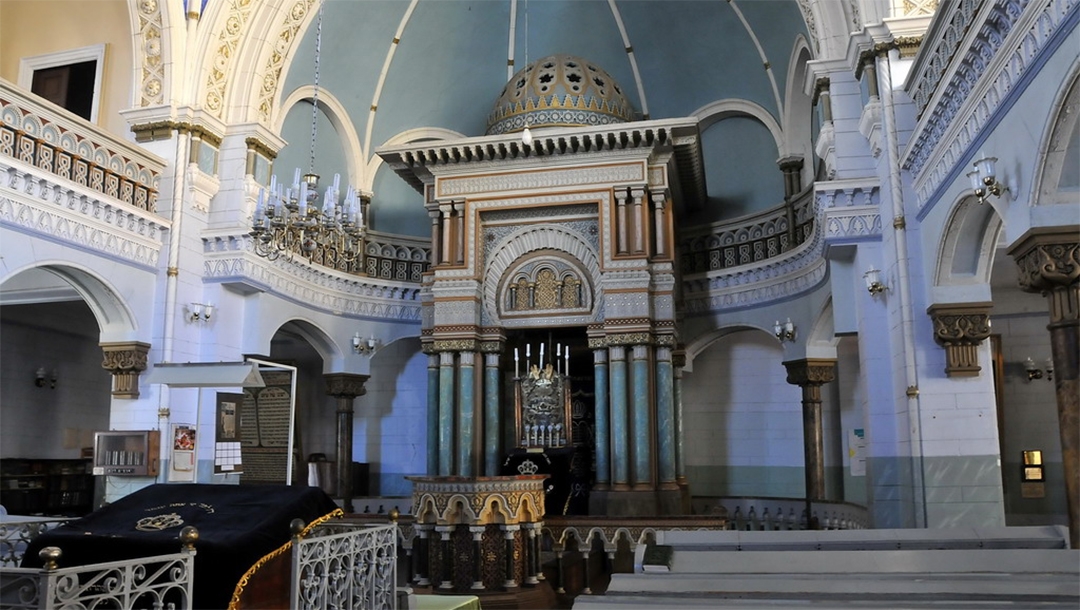Lithuanian Jews are split over the closing of only functioning synagogue in Vilnius
Published August 7, 2019

(JTA) — Lithuanian Jews are divided over a decision to close the only functioning synagogue in Vilnius purportedly for security reasons, with some communal leaders calling it disproportionate and harmful.
The divisions emerged on Wednesday, a day after the chair of the Jewish Community of Lithuania, Faina Kukliansky, announced the temporary closure of the Choral Synagogue and the headquarters of her organization in the Lithuanian capital.
ADVERTISEMENT
Simon Gurevicius, the chairman of the Jewish Community of Vilnius, which is a member of Kukliansky’s umbrella group, and leaders of five other Lithuanian Jewish communities published a statement on Wednesday criticizing the closure and questioning Kukliansky’s mandate.
Kukliansky said that closing the synagogue, a move without precedent since Lithuania became independent from Russia in 1990, was necessary because of threatening messages received by her organization. The messages, she said, denounced the Jewish community because it has objected to public and private efforts to honor Lithuanians who collaborated with the Nazis.
Neither the synagogue nor the community center have “means to insure the safety of visitors,” she wrote, adding the closures were a “difficult but inevitable” decision.
The closure made international headlines and prompted the European Jewish Congress to call “on the authorities to take all necessary measures to protect the Jewish community, including taking a tougher line against those that threaten it like neo-Nazis.”
But on Wednesday, Gurevicius, who heads the the country’s largest Jewish group, insisted the closures are unnecessary.
ADVERTISEMENT
Threatening telephone calls or letters are “not a reason to close the synagogue or the community,” Gurevicius told the Jewish Telegraphic Agency. “Jews are safe in Vilnius,” he said, noting that anti-Semitic violence is very rare in the country despite a rise in anti-Semitic rhetoric around the collaborators debate.
Gurevicius also said that prayers were held at the Choral Synagogue on Wednesday, following the closure announcement.
“It makes me doubt whether the threat is real,” Gurevicius said. He added that Kukliansky’s move was reported widely in the Russian media, helping Russian propagandists exaggerate the prevalence and scope of anti-Semitism in Lithuania.
“We need Lithuanian political leaders to take seriously the rise in anti-Semitism around the collaborators issue, and the Jewish community’s opposition to glorifying them. But this needs to come in constructive dialogue. Shutting down the Jewish community is not constructive,” Gurevicius said.
In their statement Wednesday, Gurevicius and the other communal leaders wrote: “We regret that, due to her authoritarianism,” Kukliansky “makes inaccurate statements on behalf of all Lithuanian Jews and thus potentially defames other Jews in other parts of Lithuanian society without consulting the Jewish communities in Lithuania.”
Tensions between Jewish factions in Lithuania predate the current debate. In 2017, a Vilnius District Court voided the election that year of Kukliansky as the president of the Jewish Community of Lithuania. Gurevicius and others had filed suit accusing her of manipulating the election process. Kukliansky has denied numerous allegations over transparency and corruption, and denies the election manipulation charges.
Despite the ruling, Kukliansky has neither resigned nor called a new election.
Notwithstanding the internal disputes dividing Lithuanian Jews, the debate about Nazi collaborators has led recently to an increase in anti-Semitic rhetoric that is “worrisome,” the authors of the statement concede.
Lithuanian nationalists regard the pro-Nazi collaborators as patriots for their resistance to the Soviet Union. On Wednesday, hundreds of nationalists rallied in Vilnius to protest the municipality’s decision last month to remove a plaque celebrating one alleged collaborator in the annihilation of Lithuanian Jewry, Jonas Noreika, and the renaming of the street for another Nazi-collaborator, Kazys Škirpa, who called for ethnically cleansing the country of Jews.
The municipality’s decisions have triggered several protests and followed years of legal fights and protests led by Lithuanian and foreign Jewish critics who object to the glorification of these and other Nazi collaborators as patriots.
A banner advertising Wednesday’s rally featured several boys dressed in 1920s clothes, and read: “Skirpa and the veterans are Lithuanian heroes.”One boy in the banner looks apprehensively around a corner at a large group of people flying a rainbow flag and a flag with a Star of David on it.














